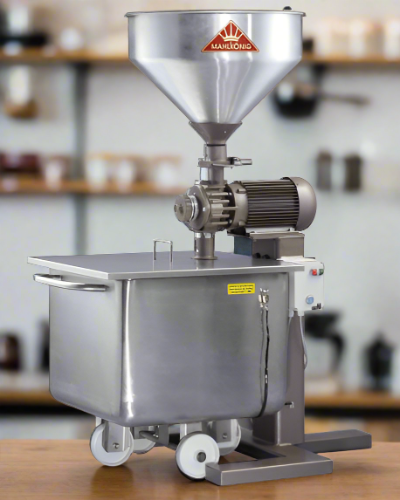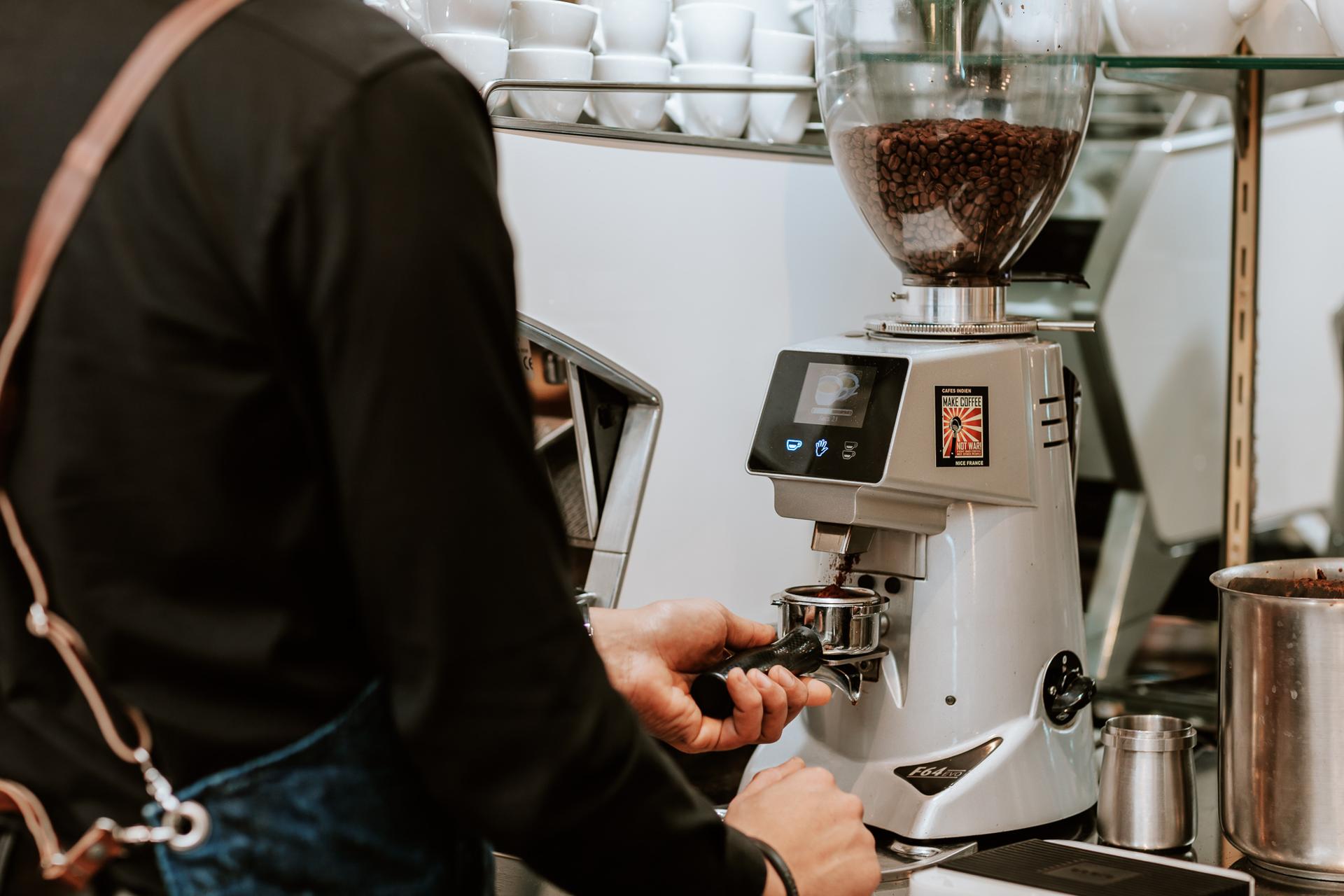Top Attributes to Try To Find in an Industrial Coffee Mill
When assessing an industrial coffee grinder, it is vital to determine crucial features that impact both performance and durability. Uniformity in grind size is essential for optimum removal, while flexible grinding speed enables a balance between performance and quality. In addition, the choice of products and design contributes dramatically to toughness and convenience of maintenance. The nuances of these functions can greatly influence not just the quality of coffee created however also the overall operational efficiency. Understanding these aspects is essential for making a notified choice that meets certain business requirements.
Grind Dimension Uniformity
While numerous factors can affect the top quality of brewed coffee, grind dimension consistency continues to be critical in accomplishing optimum removal. The harmony of coffee premises directly influences the developing procedure, as uneven bit sizes can bring about over-extraction or under-extraction. This disparity results in unbalanced flavors, where certain notes may be overpowering while others are muted.
Industrial coffee mills are developed to supply a high level of precision, typically employing burr grinding devices to make certain an uniform grind dimension. Unlike blade mills, which can develop a mix of penalty and crude particles, burr grinders squash the beans between 2 surface areas, permitting far better control over work size. This consistency is essential throughout various developing methods, whether coffee, French press, or pour-over, as each method needs certain work sizes for optimum flavor removal.
Additionally, uniformity in grind dimension contributes to the general performance of the brewing process. An uniform grind enables also water flow, decreasing the risk of boosting and carrying extraction effectiveness. In summary, spending in a commercial coffee mill with a concentrate on work dimension uniformity is crucial for accomplishing top notch coffee with desirable taste accounts.
Grinding Speed
Grinding rate plays a crucial function in the total efficiency of industrial coffee grinders, directly affecting both the top quality of the work and the efficiency of the operation. Industrial Coffee Grinder. Higher grinding rates can dramatically enhance the throughput, making it feasible to process bigger amounts of coffee beans in a much shorter time framework. This is specifically crucial for organizations that count on high-volume production, such as coffee roasteries and cafes
Nevertheless, while rate is necessary, it is equally important to balance it with the quality of the work. Excessively high grinding rates can generate heat, which might negatively impact the flavor profile of the coffee by causing the beans to lose important oils and scents. Consequently, a mill that supplies flexible speed settings can offer optimal flexibility, permitting operators to tailor the grinding process according to particular requirements.
Furthermore, the grinding rate ought to correspond to guarantee uniformity in the grind dimension, more adding to the general taste and brewing high quality of the coffee. In recap, reviewing grinding speed is critical for picking an industrial coffee grinder that meets both productivity and quality demands.
Build Top Quality and Durability
The efficiency of an industrial coffee grinder is not solely determined by its grinding speed; build top quality and longevity are similarly important variables that affect long-lasting performance and dependability. A well-constructed mill will hold up against the rigors of everyday use, making it an audio investment for any industrial procedure.

Resilience also encompasses the mill's electric motor and internal devices. Industrial coffee mills should be equipped with durable electric motors efficient in sustaining prolonged operation without overheating. Moreover, robust burrs are necessary, as they directly affect the quality of the work and contribute to the overall longevity of the machine.

Ease of Usage and Upkeep
Consistently focusing on convenience of usage and maintenance can significantly improve the functional effectiveness of a commercial coffee grinder. Straightforward attributes such as instinctive controls and clear labeling Recommended Site are vital for decreasing downtime and making sure that operators can swiftly adjust to the equipment. An ergonomic design, including height-adjustable receptacles and available grinding chambers, enables for comfy operation and helps with the loading and discharging of coffee beans.
Moreover, simplicity of maintenance is crucial for lengthening the life expectancy of the mill. Devices with removable components and elements made for quick cleaning can streamline upkeep jobs, minimizing link the time invested on regular maintenance - Industrial Coffee Grinder. Search for grinders that incorporate self-cleaning devices or need very little disassembly, as these functions can save important labor hours
Furthermore, clear upkeep routines and documentation are vital. Mills that feature detailed user guidebooks outlining upkeep procedures can help operators stick to finest practices, making sure constant performance and high quality. By purchasing a commercial coffee grinder that stresses ease of usage and upkeep, businesses can enhance performance, reduce operational prices, and keep the high requirements expected in coffee manufacturing.


Noise Degree Reduction
When selecting a commercial coffee grinder, sound level reduction is an essential factor that can substantially impact the workplace. High sound degrees can lead to worker fatigue, lowered focus, and potential hearing damage gradually, making it necessary to pick a mill created with sound-dampening attributes.
Seek grinders that include sophisticated noise-reduction innovations, such as sound-insulated housings and vibration-dampening installs. These features aid to decrease functional noises, developing a quieter atmosphere conducive to efficiency. Industrial Coffee Grinder. Furthermore, choosing mills equipped with low-noise electric motors can even more boost audio reduction, ensuring a much more pleasant working setting
Think about the mill's overall layout. The positioning of the grinder within the workspace need to be tactical.
Eventually, spending in a coffee grinder that prioritizes noise reduction not only boosts the comfort of staff members but also lines up with a dedication to keeping a safe and efficient workplace. This focus to information can lead to boosted worker fulfillment and retention.
Conclusion
In recap, selecting an industrial coffee grinder demands cautious factor to consider of numerous vital attributes. Grind size consistency is crucial for ideal extraction, while adjustable grinding speed helps with an equilibrium in between throughput and quality. The option of materials straight impacts develop high quality and toughness, making sure long life in a demanding atmosphere. Simplicity of use and maintenance, along with noise decrease innovations, boost functional effectiveness and convenience. Focusing on these features will cause a more effective grinding solution.
Industrial coffee resource mills are designed to offer a high degree of accuracy, commonly utilizing burr grinding mechanisms to make sure an uniform work size. Unlike blade mills, which can create a mix of fine and coarse bits, burr mills squash the beans in between 2 surfaces, permitting for better control over work size. In summary, spending in an industrial coffee mill with a focus on work size uniformity is necessary for achieving top notch coffee with preferable taste profiles.
Grinding rate plays a vital role in the total performance of industrial coffee mills, directly affecting both the quality of the work and the performance of the operation. A grinder that provides adjustable rate setups can give optimal adaptability, permitting drivers to tailor the grinding process according to specific demands.
Comments on “How an Industrial Coffee Grinder Can Enhance Your Coffee Quality”